Key takeaways:
- Artist development focuses on nurturing an artist’s unique identity, skills, and marketability, emphasizing self-discovery and overcoming self-doubt.
- Essential skills for emerging artists include songwriting, performance, social media savvy, networking, and brand development to enhance artistry and industry navigation.
- Effective personal branding includes self-discovery, maintaining consistency across platforms, and engaging authentically with fans to build lasting relationships.
- Networking strategies, like leveraging social media and attending industry events, can open doors to opportunities and foster meaningful connections.
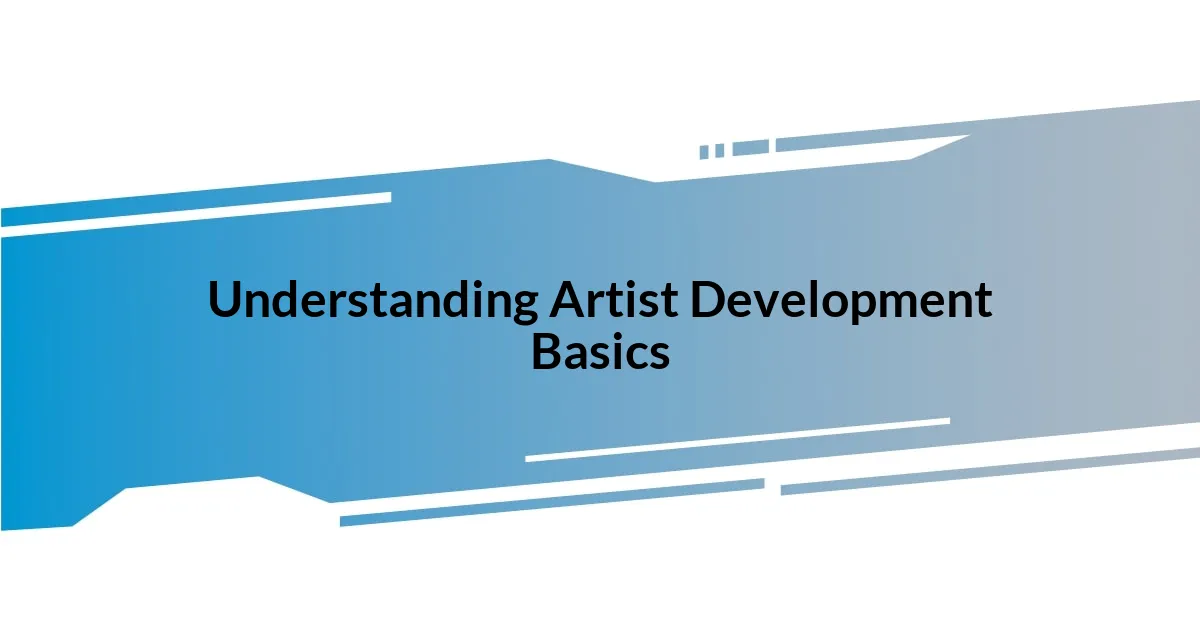
Understanding Artist Development Basics
Artist development is essentially the nurturing of an artist’s unique identity, skills, and marketability. I still remember the early days when I worked with a budding musician, helping them explore their sound and style. It was fascinating to witness how a simple jam session could transform into a profound expression of who they are as an artist. Isn’t it incredible how, through this process, artists can discover not just their music but also themselves?
At its core, artist development involves honing an artist’s craft, expanding their audience, and ensuring they have a strong understanding of the music industry. I’ve seen artists struggle with the technical aspects of their work, but what often holds them back is self-doubt. Isn’t it wild to think that overcoming those mental barriers can be just as crucial as refining their vocals or mastering an instrument?
Another vital component of artist development is creating a brand, something I believe goes hand in hand with artistic growth. When I collaborated with a visual artist, we spent hours discussing how their art reflected who they were. It made me realize how vital it is for artists to communicate their essence—who they are, what they stand for, and how they wish to connect with their audience. Have you ever stopped to wonder how your favorite artists convey their stories?
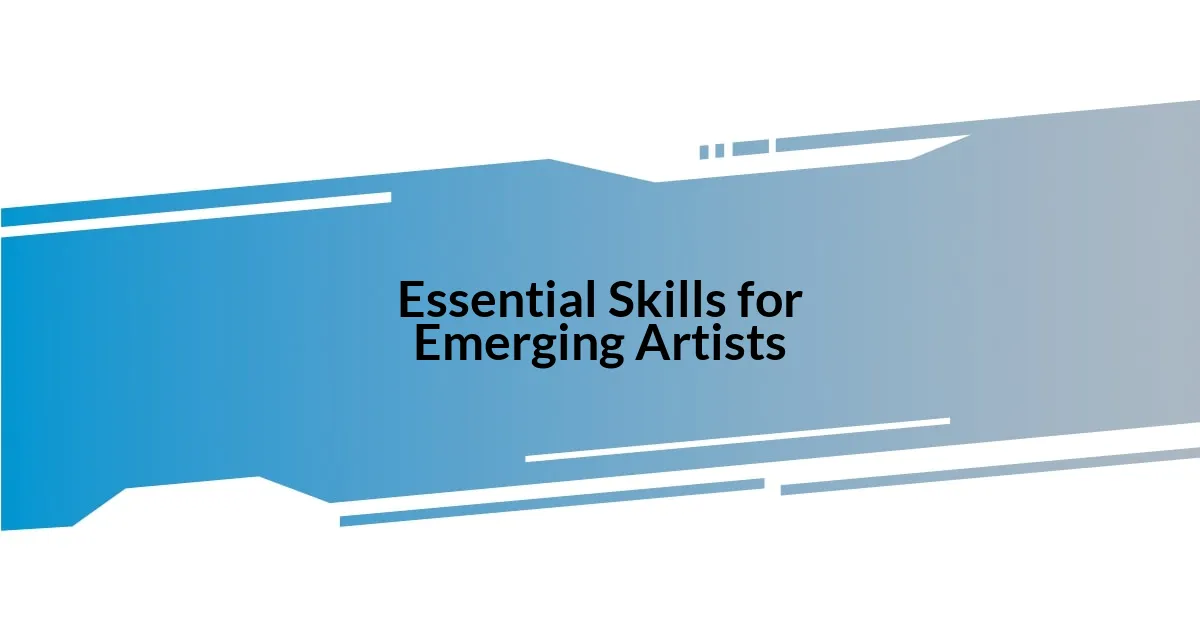
Essential Skills for Emerging Artists
Emerging artists need to embrace a diverse skill set to thrive in today’s competitive landscape. I recall a moment during a workshop where an artist shared their struggle with not only songwriting but also performing live. Watching them overcome that fear by engaging with the audience opened my eyes to the profound impact of communication skills—it’s not just about the music; it’s about creating a genuine connection. Additionally, understanding social media and digital marketing is crucial for artists today. It’s surprising how many don’t realize that their online presence can define their brand and reach.
Here are some essential skills I believe every emerging artist should focus on:
- Songwriting: Crafting catchy melodies and meaningful lyrics helps convey emotions and connect with audiences.
- Performance Skills: Mastering stage presence and connecting with listeners can elevate any show.
- Social Media Savvy: Using platforms like Instagram or TikTok effectively can spread an artist’s music and boost audience engagement.
- Networking: Building relationships in the music industry can lead to collaborations and opportunities.
- Brand Development: Artists should be able to articulate their unique identity and vision to foster a loyal fan base.
By focusing on these essential skills, emerging artists will not only enhance their artistry but also navigate the music industry more effectively.
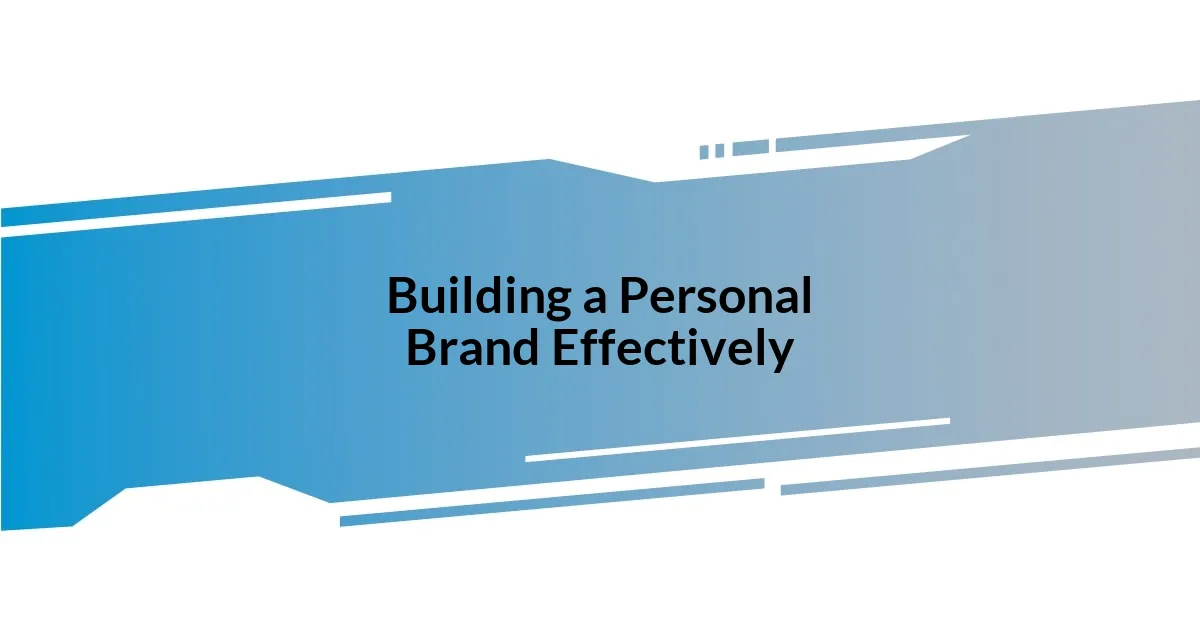
Building a Personal Brand Effectively
Building a personal brand effectively is crucial for any artist looking to make their mark. I once worked with an indie musician who seemed unsure of how to present themselves. Together, we explored their passions and interests beyond music. This process allowed them to weave unique aspects of their personality into their branding, making them memorable to their audience. The image we created together resonated not just visually but emotionally, fostering a deeper connection.
When it comes to brand consistency, I can’t emphasize enough how vital it is for artists to maintain a cohesive message across all platforms. I cherished moments when an artist shared how their followers would recognize them solely based on their visual style or tone of voice. This kind of recognition doesn’t happen overnight, but with dedication, it builds trust and loyalty among fans. Wouldn’t you agree that having a recognizable brand can significantly elevate an artist’s presence in an industry that’s constantly evolving?
Lastly, I always encourage artists to engage with their audience personally. I recall this one artist who chose to share their behind-the-scenes moments on social media. The response was overwhelmingly positive; fans felt they were part of the journey. Authenticity invites connection, and my belief is that it can transform a simple fan into a lifelong supporter. After all, isn’t the goal to create relationships that elevate not just the art, but the artist themselves?
| Aspect | Importance |
|---|---|
| Self-Discovery | Uncovering personal passions enhances brand authenticity. |
| Consistency | Maintaining a unified message cultivates trust. |
| Engagement | Connecting with fans personally builds lasting relationships. |
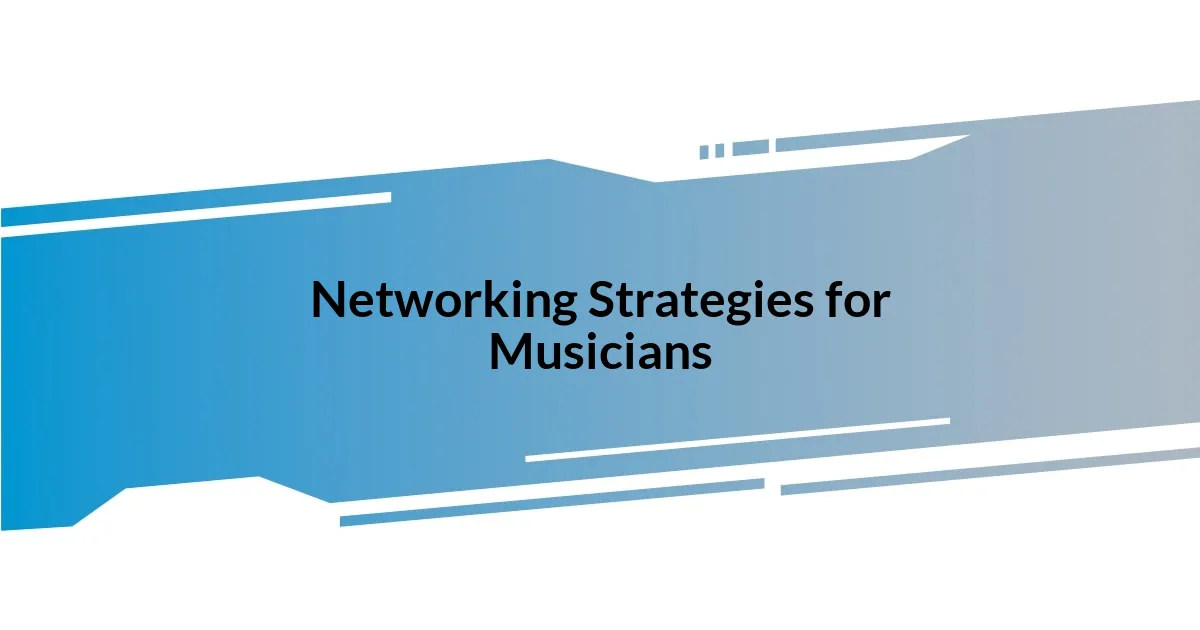
Networking Strategies for Musicians
Networking in the music industry can feel daunting, but I’ve found it essential for growth. I remember attending a local music showcase where I actively approached fellow artists and industry professionals. It was amazing how a simple conversation led to a collaboration that not only enriched my network but also brought new opportunities I hadn’t considered before. Have you ever stepped out of your comfort zone to engage with someone new? It can be transformative.
Leveraging social media for networking is another powerful strategy. I once posted a behind-the-scenes look at a rehearsal, tagging the musicians I was working with. The result was unexpected; not only did we get more engagement from fans, but we also attracted attention from industry folks who appreciated our vibe and sound. This reminded me that sharing genuine moments can open doors to relationships that feel authentic rather than forced. Do you share your journey online?
Finally, attending workshops or industry events can significantly broaden your connections. I recall a music conference where I met a producer who later became instrumental in my development. Just by being present and engaging with different sessions, I found mentors and allies who believed in my vision. Isn’t it fascinating how being proactive can lead to unexpected possibilities? It’s all about showing up and participating in the community—because the more connected you are, the further your music can travel.
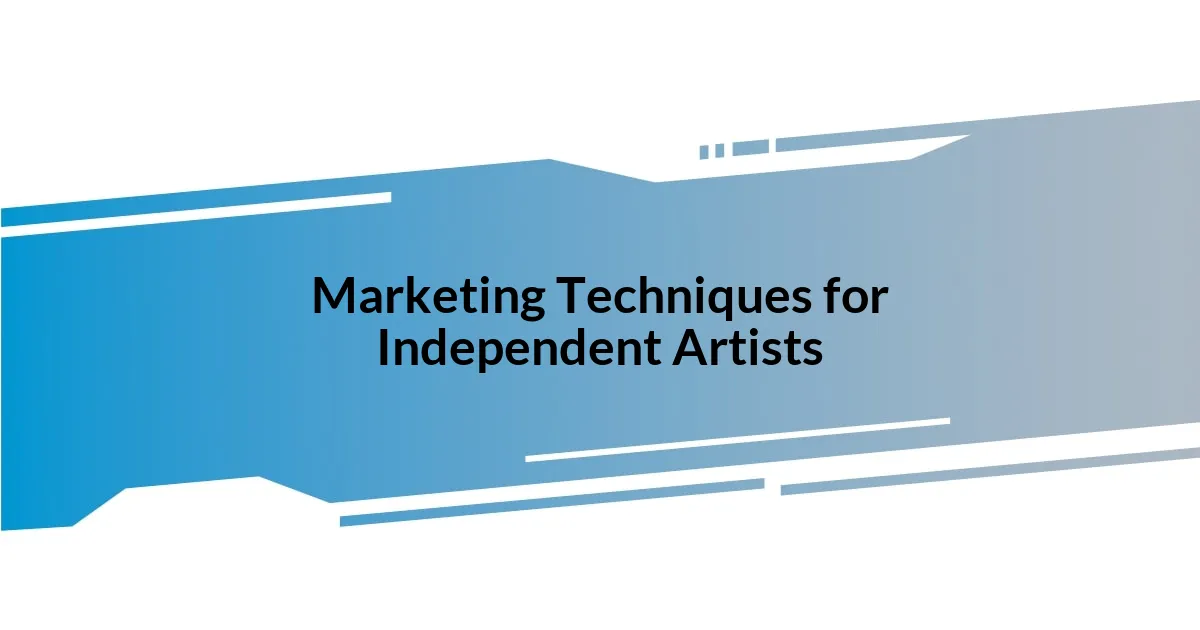
Marketing Techniques for Independent Artists
Marketing independently as an artist can be a game-changer. I remember my own journey when I started promoting my music by using email newsletters. Crafting personalized messages helped me connect with fans on a deeper level, sharing not just updates but snippets of my creative process. I still get messages from fans about how that approach made them feel included in my artistic journey. Have you considered how direct communication can enhance your relationship with your audience?
Another effective technique is utilizing platforms like Bandcamp or SoundCloud to release singles. I experimented with this by dropping an acoustic version of a song that hadn’t been formally released. The immediate feedback from my listeners was exhilarating; they felt like they were part of something special. This approach creates an intimacy that bigger platforms sometimes overlook. Wouldn’t you love to create that unique connection with your fans?
Creating visually captivating content is also essential in today’s digital landscape. I once collaborated with a photographer friend to create a series of artistic images that reflected the mood of my upcoming album. The engagement we received on those posts blew me away. People didn’t just interact with my music; they connected with the visuals and the story behind the art. How do you represent your music visually, and is it a reflection of who you are?
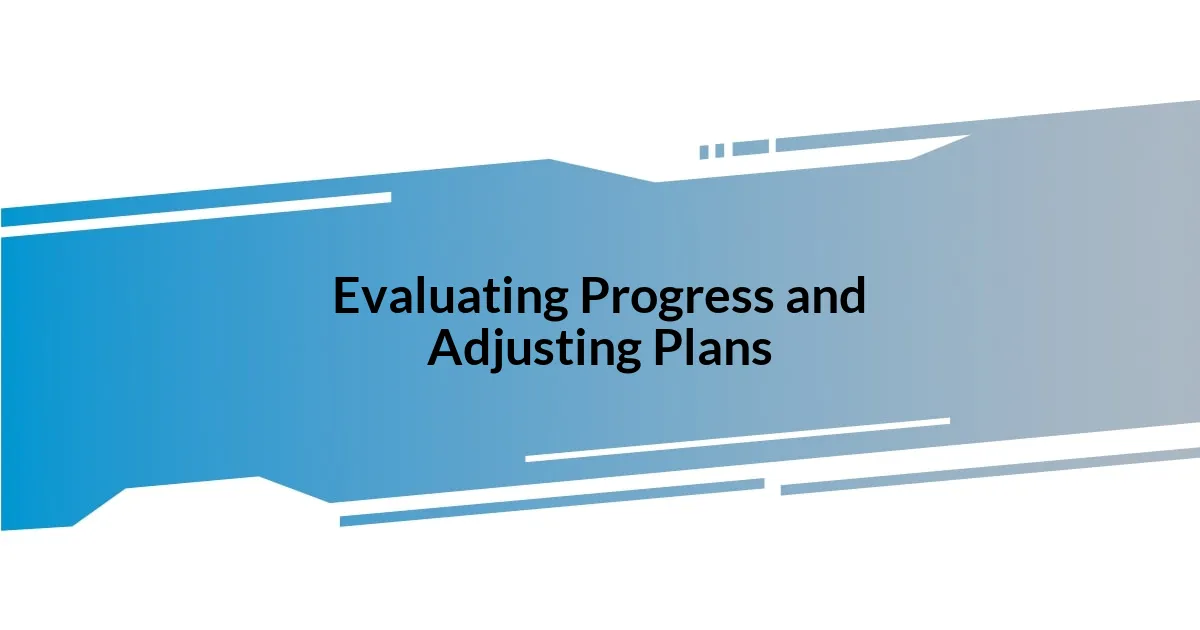
Evaluating Progress and Adjusting Plans
Evaluating progress in artist development is vital for staying on track. I’ve often used milestones like song releases or performance feedback to gauge where I stand in my journey. Reflecting on those moments helps me understand not just what I’ve achieved, but also where I need to pivot. Have you taken time to reflect on your artistic journey lately? It can be enlightening.
Adjusting plans is equally important. Sometimes, I’ve found that sticking rigidly to a path can hinder creativity. For instance, I once aimed to release an EP on a specific date but realized I needed more time to refine my sound. Delaying the release wasn’t a setback; it allowed me to create something that truly resonated with me and my audience. Have you ever reassessed your timeline to better align with your artistic vision?
Moreover, I find it’s beneficial to seek feedback from peers. A close friend in the industry once encouraged me to play a song I was uncertain about during an informal gathering. Their enthusiastic response opened my eyes to its potential and led me to reevaluate my approach entirely. Engaging with others not only provides fresh perspectives but also fosters collaboration. How do you incorporate feedback from those around you in your own artistic growth?